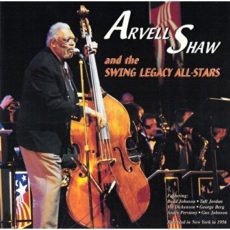
Daily Dose Of Jazz…
Arvell Shaw was born on September 15, 1923 in St. Louis, Missouri and learned to play tuba in high school, but switched to bass soon after. In 1942 he worked with Fate Marable on the Mississippi riverboats, then served in the Navy from 1942 to 1945.
After his discharge Arvell played with Louis Armstrong’s last big band, from 1945 to 1947. He and Sid Catlettthen joined the Louis Armstrong All-Stars until 1950, when he left to study music. He returned to play with Armstrong from 1952 to 1956, and performed in the 1956 musical High Society.
Following this he worked at CBS with Russ Case, did a stint in the Teddy Wilson Trio, recorded with Red Allen in 1957 and played with Benny Goodman at the 1958 Brussels World’s Fair. After a few years living and performing in Europe, he played again with Goodman on a tour of Central America in 1962. From 1962–64 Shaw played again with Armstrong, and occasionally accompanied him through the end of the 1960s.
After the Sixties he mostly freelanced in New York and kept playing until his death. He recorded only once as a leader, a live concert from 1991 of his Satchmo Legacy Band. Double-bassist Arvell Shaw, who recorded with Armstrong and Wilson, passed away on December 5, 2002 in Roosevelt, New York.
![]()
More Posts: bass
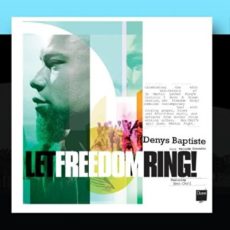
Daily Dose Of Jazz…
Denys Baptiste was born on September 14,1969 in London, England. He studied music at school from the age of 13 and then at the West London Institute, aka Brunel University. In 1992, he continued his music education at London’s Guildhall School of Music, studying under former Jazz Messenger, Jean Toussaint and is a graduate of Tomorrow’s Warriors.
Baptiste played with Gary Crosby and Nu Troop, McCoy Tyner, Andrew Hill, Ernest Ranglin, Bheki Mseleku, Marvin “Smitty” Smith, Michael Bowie, Courtney Pine, Manu Dibango, Gary Crosby, Steve Williamson, Julian Joseph, Jason Rebello, Martin Taylor, Lonnie Plaxico, Ralph Moore, Billy Higgins, Jerry Dammers, Sean Oliver, Jean Carne, Marlena Shaw, Noel McCoy, Juliet Roberts, Incognito and Jazz Jamaica.
He released his debut album in 1999, Be Where You Are, and received a nomination for a Mercury Music Prize, and won the MOBO award for Best Jazz Act 1999. Denys has released two albums since, garnering another nomination for the MOBO award for Best Jazz Act, the BBC Jazz Awards for Best New Work and Best Album, and the Parliamentary Jazz Award for Best Album for his third album Let Freedom Ring! Was in 2004.
Tenor and soprano saxophonist, composer and arranger Denys Baptiste continues to embark on new projects in addition to performing.
![]()
More Posts: saxophone
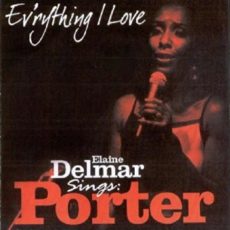
Daily Dose Of Jazz…
Elaine Delmar was born Elaine Hutchinson in Harpenden, Hertfordshireon, England on September 13, 1939 to jazz trumpeter Leslie “Jiver” Hutchinson. Educated at Rhodes Avenue and Trinity Grammar schools inWood Green. She studied piano between the ages of six and eleven, reaching Grade VII of the Associated Board examinations.
She made her first broadcast at the age of thirteen playing piano on the Children’s Hour, aged 13, and later sang with her father’s band at American bases. In 1952/1953, Elaine appeared in Finian’s Rainbow in Liverpool. She sang with Coleridge Goode’s group The Dominoes for a month in Germany in the mid-1950s before going solo.
Delmar performed in clubs and on overseas tours over the next several years and appeared in the Ken Russell film Mahler in 1974. During 2010 she was a featured singer with Wynton Marsalis’s Lincoln Center Jazz Orchestra. In 2012 she performed on the P & O Cruise liners, has appeared in several theatrical productions and performs sporadically.
Sponsored By
www.whatissuitetabu.com
![]()
More Posts: vocal
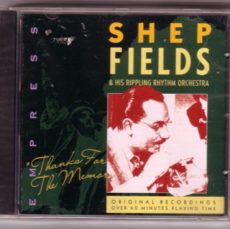
Daily Dose Of Jazz…
Shep Fields was born Saul Feldman in Brooklyn, New York on September 12, 1910, He played the clarinet and tenor saxophone in bands during college. In 1931 he played at the Roseland Ballroom and by 1933 he led a band that played at Grossinger’s Catskill Resort Hotel. In 1934 he replaced the Jack Denny Orchestra at the Hotel Pierre in New York City. He left the Hotel Pierre to join a roadshow with the dancers,Veloz and Yolanda. In 1936 his performance at Chicago’s Palmer House was broadcast on the radio.
The sound of his wife was blowing bubbles into her soda became his trademark that opened each of his shows. Holding a contest in Chicago for fans to suggest a new name for the band and with “rippling” suggested in more than one entry, Fields came up with “Rippling Rhythm.”
By 1936 he received a recording contract with Bluebird Records and had hits Cathedral in the Pines, Did I Remember? and Thanks for the Memory. In 1937 Fields replaced Paul Whiteman in his time slot with a radio show called The Rippling Rhythm Revue with Bob Hope as the announcer. In 1938, Fields and Hope were featured in his first feature-length motion picture, The Big Broadcast of 1938.
In 1941 Fields revamped the band into an all-reeds group, with no brass section. “Shep Fields and His New Music,” featuring band vocalist Ken Curtis. He reverted to Rippling Rhythm in 1947.
He disbanded the group in 1963, moved to Houston, Texas and became a disc jockey, later worked at Creative Management Associates with his brother Freddie. Shep Fields, who made a mark during the Big Band era, passed away on February 23, 1981 at Cedars-Sinai Medical Center in Los Angeles, California from a heart attack.
![]()
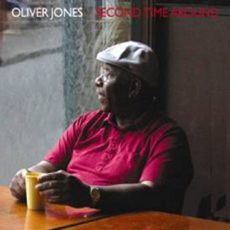
Daily Dose Of Jazz…
Oliver Jones was born Oliver Theophilus Jones on September 11, 1934 in Little Burgundy, Montreal, Quebec, Canada. He began his career as a pianist at the age of five, studying with Mme Bonner in Little Burgundy’s Union United Church, made famous by Trevor W. Payne’s Montreal Jubilation Gospel Choir. He continued developing his talent through studies with Oscar Peterson’s sister Daisy Peterson Sweeney starting at eight years old. In addition to church, as a child he performed at the Cafe St. Michel, other clubs and theaters in the Montreal area.
He started his early touring in Vermont and Quebec with a band called Bandwagon, and in 1953–63 played mainly in the Montreal area, with tours in Quebec. From 1964 to 1980 Jones was music director for the Jamaican calypso singer Kenny Hamilton, based out of Puerto Rico. By late 1980 he teamed up with Montreal’s Charlie Biddle, working in and around local clubs and became the resident pianist at Charlie’s jazz club Biddles from 1981 to 1986. He recorded his debut album, Live at Biddles in 1983, and was the first record on the Justin Time record label.
By the mid-1980s he was travelling throughout Canada, appearing at festivals, concerts and clubs, either as a solo artist or with the trio of Skip Bey, Bernard Primeau and Archie Alleyne. His travels also took him to Europe during this period, then on to a tour of Nigeria that became the subject of a 1990 National Film Board of Canada documentary, Oliver Jones in Africa.
Oliver is also an educator having taught music at Laurentian University, McGill University and mentored jazz artist Dione Taylor through the Governor General’s Performing Arts Awards Mentorship Program. He was named an Officer of the Order of Canada and has been bestowed the National Order of Québec, with the rank of Chevalier (Knight). He has won a Juno, four Felix awards, voted keyboardist of the year, received the Governor General’s Performing Arts Award and became the second recipient of the Oscar Peterson Award after Oscar himself.
Pianist, composer and bandleader Oliver Jones has recorded twenty-four albums as a leader, worked with Ranee Lee, Herb Ellis, Ray Brown, Clark Terry and Oscar Peterson, among others, and continues to perform and tour.
![]()
More Posts: piano



